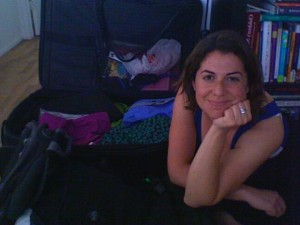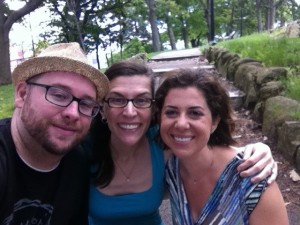 I am an eager learner, critical thinker, and sensitive communicator with a fervent desire to do work that matters. I believe in the value of inter-disciplinary collaboration for building, remixing, and extending theory, and constructing comprehensive, practical responses to multi-faceted, real world challenges. My methods are mixed, my style is collegial, and my aim is to support youths’ development.
I am an eager learner, critical thinker, and sensitive communicator with a fervent desire to do work that matters. I believe in the value of inter-disciplinary collaboration for building, remixing, and extending theory, and constructing comprehensive, practical responses to multi-faceted, real world challenges. My methods are mixed, my style is collegial, and my aim is to support youths’ development.
How I got here is an easy story to tell. My loving parents, both caregivers by profession (dentist father, social worker-turned-housewife-turned-social worker mother), raised my two siblings and me in a town populated by “have’s.” While there were and still are richer folks financially, few have access to our community’s social capital – at least, that’s what both Reverend Jesse Jackson and then-President Bill Clinton said during their separate visits to my high school during my senior year. Later, as a college freshman enrolled in a sociology course entitled “Social Inequality: Race, Class, and Power,” I read Jonathan Kozol’s landmark book Savage Inequalities (1991), which pitted the privileges enjoyed by students in my town against the deprivations endured by students in East St. Louis, where schools couldn’t afford toilet paper. This made an impression. So too did my realization that, beyond creature comforts and access to power, I was given emotionally responsive contexts, both at home and at school, in which to grow safely and love freely. I became a Social Policy major because I knew such gifts were not my right, I was just born lucky; or perhaps such gifts are everyone’s right, and “luck” should be taken out of the equation.
For the past 10+ years, I have designed, delivered, and assessed curricula to support youths’ learning; importantly, these curricula facilitate not just cognitive development, but social and emotional development as well. With the support of my polymathic advisor, Dr. Henry Jenkins, and diverse university institutions — e.g., USC Joint Educational Project, USC Institute for Multimedia Literacy, USC Annenberg Innovation Lab, USC Shoah Foundation, and USC Impact Games — my interdisciplinary, community-focused work has been applied to educational settings in Los Angeles and around the world. My specific research interests include:
- Empathy and social and emotional learning;
- Interactive, inquiry-driven pedagogy and assessment (e.g., connected learning, participatory learning, experiential learning, participatory action research);
- Productive problem-solving across no-tech, low-tech, and high-tech contexts (e.g., media literacy, new media literacies, digital citizenship); and
- Powerful play (e.g., impact games, experimentation and improvisation for discovery).
Because I care about both maximizing the effectiveness of educational interventions and richly understanding program-related change, assessment is incredibly important to me. Twenty-first century skills, which I have identified in my publications as new media literacies (NMLs) plus social and emotional learning skills (SELs), are what I have sought to theorize, teach, and assess (see Felt & Rideau, 2012; Felt, Vartabedian, Literat, & Mehta, 2012; Vartabedian & Felt, 2012). Recently, I adapted the NMLs from a list of 12 discrete skills to a list of 6 paired skills, and then identified which NML pair plus two SELs collectively represent a characteristic of digital citizenship (see www.laurelfelt.org/skill-composites). The programs I have co-designed and evaluated (e.g., Sunukaddu 2.0, Explore Locally Excel Digitally, Summer Sandbox, PLAYing Outside the Box) outreach to educators and students via professional development and developmentally-appropriate curricula, respectively, and utilize both participatory learning strategies and media-making to enhance 21st century skill proficiency.
I always use mixed methods to study impacts, including pre-mid-post surveys, ethnographic field notes, interviews or focus groups, and analysis of participants’ works.
But for the past two years, I also have expanded my assessment toolkit in order to recognize traditionally overlooked data, which my co-authors and I have termed “cultural beacons” (CBs). CBs are culturally-embedded, user-defined measures for understanding communicative meaning(s), components, and sites of change; they illuminate (as beacons do) unique features of people and places (Felt, Dura, & Singhal, in press; Dura, Felt, & Singhal, 2012). Detecting CBs requires researchers’ sensitive listening and informed observation, made possible through respectful community partnerships and participatory methodologies. Accordingly, I embraced participatory action research with the PLAY! project, and am using this approach for conceptualizing my dissertation, “A Face is Worth a Thousand Words: Using Badges to Train Teachers in Non-verbal Sensitivity and Improvisation.” This dissertation investigates if/how training novice teachers in non-verbal sensitivity and improvisation impacts both the proliferation and management of “teachable moments” — critical points when students are poised to meaningfully learn because they perceive a connection between their studies and their lives. Crucially, this teacher training will be administered online via an original curriculum that uses digital badges to impact social and subjective norms, support community-building, and celebrate the journey.
In terms of my career, I am committed to keeping my mind and options open, for life (I hope!) is long and the world is ever changing. Because I love teaching and conducting research to enrich educational programs, I could remain in academia. I also could continue to provide consulting services for organizations domestic and foreign, based in the West, Far East, and Global South, who register as non-profit, for-profit, and governmental. To 20+ organizations over the years, I have delivered: curriculum and assessment development; training and professional development; program evaluation; media literacy for children and families; children’s media research; and impact game consulting. As long as we care to better support our children’s healthy development and expand their opportunities, there will be work for me to do, and I will want to do it.



